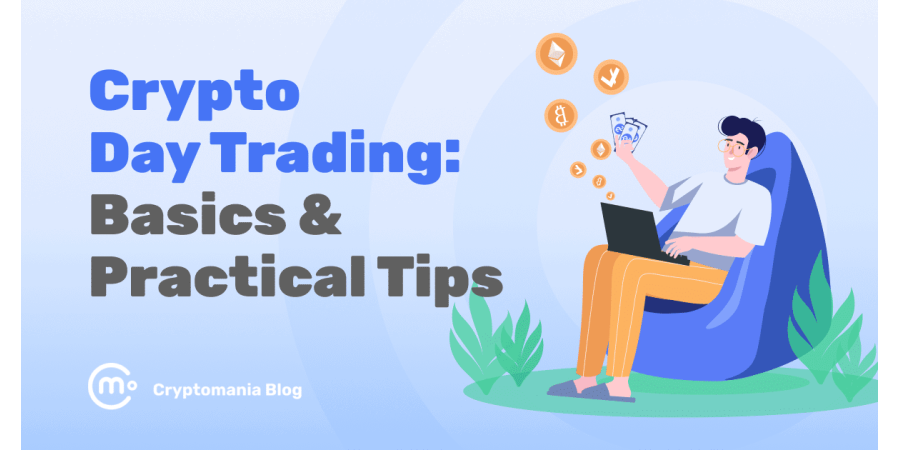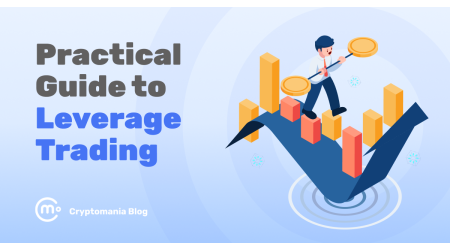Crypto Day Trading for Beginners: Complete Guide
Vuk Martinovic


Let’s face it: crypto moves faster than your morning coffee order. One second Bitcoin’s pumping, the next it’s freefalling like your weekend diet. Blink, and you might miss the action.
That’s what crypto day trading is for. In plain English, it’s all about buying and selling crypto within the same day, aiming to pocket small profits from quick price moves. Think of it like surfing: you’re riding the waves of momentum instead of waiting for long-term trends.
Now, is it risky? Sure, if you’re just guessing. But day trading isn’t gambling if you’ve got a plan, some practice, and the right tools. And we’ll break all of that down for you in this guide.
What is day trading crypto?
Day trading crypto is exactly what it sounds like — buying and selling cryptocurrencies within the same day, sometimes within the same hour or minute. You’re not in it for the long term. You’re here to ride the short-term waves, grab some quick profits, and close out your positions before the day is done.
Instead of waiting weeks or months for your coin to “moon,” you’re watching price charts in real time, looking for patterns, breakouts, and momentum shifts you can capitalize on. Most day traders aim to make money from small price swings — even a 1% move can be profitable if you’re using the right strategy and tools.
The appeal? It’s fast-paced, hands-on, and potentially lucrative. You’re not tied to the emotional rollercoaster of long-term investing — you’re in and out, done for the day.
But here’s the catch: it’s not as easy as it sounds. Day trading takes focus, quick decision-making, and the ability to manage risk. Without a plan, it’s easy to get caught up in the hype, FOMO (fear of missing out) into bad trades, and drain your funds before lunch.
That’s why successful day traders study, practice, and refine their skills daily.
Is day trading crypto worth it?
The short answer? It depends on you.
Day trading crypto can be worth it — but only if you treat it like a skill, not a shortcut to becoming rich. If you’re the type who enjoys fast decision-making, thrives under pressure, and doesn’t mind staring at price charts for hours, you might actually love it.
Discipline is everything here. You need a plan, clear rules, and the self-control to follow them — even when the market is moving like a rollercoaster. Without that, day trading turns into emotional chaos (and probably a drained account).
On the flip side, if you’re easily swayed by hype, can’t resist chasing green candles, or get stressed watching the market tick up and down… this might not be your lane.
Also, let’s set the record straight: day trading is not a get-rich-quick scheme.
It’s a game of probabilities, risk management, and consistency. Some days you’ll win, some you won’t. The key is making more good trades than bad ones over time — and protecting your capital along the way.
So, is it worth it? For some, yes. But only if you’re ready to learn, practice, and trade with a clear head — not just vibes.
Is crypto day trading profitable?
Yes — crypto day trading can be profitable. But it’s not about luck or guessing which coin might pump next. Profits come from smart decisions, not random buys.
If you’ve got a solid strategy, understand the market’s mood, and know when to get in (and out), you can stack up small wins that add up over time. But don’t forget — the crypto market is wild. Prices can swing in seconds, and without discipline, even a good trade can go bad fast.
That’s why practice is necessary. There are plenty of free tools and resources to learn crypto trading without spending a penny.
Before throwing real money into the mix, we’d recommend testing your skills using a demo trading tool. It lets you trade real market conditions without risking a single dollar. You can learn how to read charts, test your strategies, and see what works. And all that time, your money is safe.
The truth? Most beginner traders lose money because they jump in too fast. But the ones who take time to learn, practice, and stay cool under pressure? They’re the ones who actually make day trading work.
So yes — it can be profitable. But only if you treat it like a job, not a lottery ticket.
How to start day trading crypto for beginners
Ready to dive in? You don’t need to be a finance wizard or a chart nerd to start day trading. You just need a clear plan and the right tools. Here’s how to get going:
Step 1: Learn the basics
Before anything else, make sure you understand how the crypto market works. What moves prices? Why do some coins spike while others stay flat? Learn about supply and demand, market trends, and the psychology behind trading. Oh, and take note of the most common beginner mistakes, so you don’t repeat them.
Step 2: Pick your exchange
This is your trading playground. You’ll want a platform that’s fast, secure, low on fees, and has real-time charts. We’ll cover what to look for (and where to trade) in the next section.
Step 3: Practice with demo trading
Before risking your hard-earned money, train your brain with a demo simulator such as Cryptomania. You’ll trade with fake funds in real market conditions — perfect for testing strategies, building confidence, and making mistakes without financial pain.
Step 4: Start small
Even when you’re ready to go live, keep your first trades small. It’s better to grow slow and steady than blow your whole budget on one bad move.
Step 5: Use simple strategies
You don’t need anything fancy. Start with one or two basic, proven strategies and test them. We’ve got a full guide on how to start trading crypto for beginners you can check out for inspiration.
How to pick crypto for day trading
Not all coins are built for day trading. Some barely move, while others bounce around like a pinball machine. If you want action and the chance to profit you need to pick the right assets.
1. Look for high volume and liquidity
This just means the coin is being actively traded, so it’s easy to buy and sell without crazy price slippage.
The higher the volume, the smoother your trades.
Avoid ghost-town tokens where you’re stuck waiting for someone to take your order (buy what you’re trying to sell, or sell what you’re trying to buy)
2. Volatility is your friend
Day traders love volatility — price swings are where the money’s made. You’re not looking for coins that creep up 0.1% a day. You want movement. Coins that swing up and down throughout the day give you more opportunities to jump in and out with profits.
3. Watch the news and trends
Sometimes, a coin pumps simply because it’s trending on social media or there’s some hot news. New exchange listings, partnerships, or big announcements can trigger major moves and create golden opportunities for day traders.
Bottom line? Pick coins that are active, volatile, and popular because boring coins don’t make exciting trades.
Best crypto exchanges for day trading
Your exchange is your trading battlefield, so pick a good one. A bad platform can cost you more in slow trades and high fees than any losing position ever will.
What to look for:
- Low trading fees – When you’re making multiple trades a day, those little fees add up fast. Look for platforms with competitive rates or VIP fee structures.
- Fast execution – Speed matters. You need trades to go through immediately, not 15 seconds later when the price has already changed.
- Reliable charts and tools – You’ll be staring at charts for hours. Make sure the platform has solid charting features, live price updates, and the ability to set stop-losses or limit orders.
- Strong security – Two-factor authentication, withdrawal protection, and a solid track record are must-haves. You’re dealing with real money — don’t compromise.
Popular exchanges for day trading
There are over 200 crypto exchanges, but here are a few that are commonly used by many crypto day traders:
- Binance – Huge volume, low fees, and tons of trading pairs.
- Kraken – Great for security and pro-level tools.
- Bybit / OKX / KuCoin – High leverage options and strong mobile apps.
Mobile VS desktop trading
Day trading on your phone? It’s definitely doable, but desktop is usually the better choice, at least in our opinion. You get more chart visibility, easier order management, and less chance of fat-finger mistakes during fast moves.
Should you take a crypto day trading course?
A good course can definitely help you level up faster but let’s be clear: you don’t need to drop $500 on someone’s “secret millionaire strategy” just to learn how to trade.
There’s a ton of free content out there that covers the basics, from YouTube tutorials to blog guides (like this one). Pair that with a nice trading simulator like Cryptomania, and you can get real hands-on practice without risking a cent.
Courses make the most sense when you’ve already grasped the basics and want to dive deeper into specific strategies or techniques. But if someone’s promising fast profits, luxury cars, and early retirement from day trading… yeah, that’s probably a scam.
So here’s the move:
- Start with free resources.
- Use demo trading to practice.
- And if you decide to take a course, make sure it’s legit, well-reviewed, and focused on education — not hype.
A real course should teach you skills, not sell you dreams.
Final thoughts: Learn, practice, repeat
Day trading isn’t luck. It’s a skill — just like driving, cooking, or playing an instrument. And like any skill, the more you practice, the better you get.
Don’t rush. Don’t trade blindly. And definitely don’t go all-in on your first day. Use demo tools to test your strategies, get familiar with the market, and build real experience without putting real money at risk.
Stay sharp. Markets move fast, and hype can cloud your judgment. The best traders stay calm, focused, and skeptical always asking, “What’s the data telling me?” instead of chasing the next shiny coin.
So if you’re serious about day trading crypto, start smart. Learn the basics. Practice with purpose. And when you’re ready, trade with a clear head and a solid plan.
No magic. No shortcuts. Just skill, strategy, and reps.
FAQ
Is crypto day trading legal?
Yes, day trading crypto is legal in most countries as long as the exchange you use is licensed and operates in your region. Just make sure to check your local regulations and tax obligations.
How much money do I need to start day trading crypto?>
You can start with as little as $10–$50 on most exchanges, but that probably won’t get you far. Start small to learn, then gradually increase your capital as your skills improve. Never trade more than you can afford to lose.
How long does it take to become good at day trading?
It depends on how much time you put into learning and practicing. Some people get the hang of it in a few weeks, others take months or even years. Using demo tools like Cryptomania can speed up the process without risking real money.
Can I day trade crypto on my phone?
Yes, most major exchanges have mobile apps. But for serious day trading, desktop is usually better — more screen space, more tools, and fewer mistakes during fast market moves.
Can you make $200 a day trading?
Yes, it’s possible but not guaranteed. Hitting $200 a day depends on your trading capital, skill level, market conditions, and strategy. Many beginners aim too high, too fast. Focus on consistency first, then scale up over time. And remember: some days you win, some you don’t — that’s part of the game.





